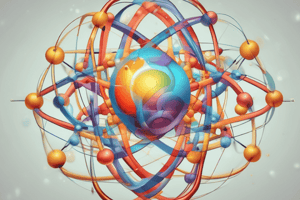Podcast
Questions and Answers
What is the fundamental unit of matter?
What is the fundamental unit of matter?
- Synthesis and decomposition
- Chemical reactions
- Protons, electrons, and neutrons (correct)
- Atoms and molecules
Which type of chemical reaction involves the formation of new compounds?
Which type of chemical reaction involves the formation of new compounds?
- Decomposition
- Atomic structure
- Synthesis (correct)
- Molecular structure
What is the arrangement of atoms in a molecule called?
What is the arrangement of atoms in a molecule called?
- Molecular structure (correct)
- Chemical reactions
- Synthesis
- Decomposition
What are the processes by which one chemical species transforms into another known as?
What are the processes by which one chemical species transforms into another known as?
What aspect of matter is crucial for understanding how chemicals interact and react with each other?
What aspect of matter is crucial for understanding how chemicals interact and react with each other?
What is the main focus of spectroscopy?
What is the main focus of spectroscopy?
Which technique provides information about the vibrational, rotational, and electronic energy levels of atoms and molecules?
Which technique provides information about the vibrational, rotational, and electronic energy levels of atoms and molecules?
What is the primary goal of materials science?
What is the primary goal of materials science?
What is one recent advancement in chemistry mentioned in the text?
What is one recent advancement in chemistry mentioned in the text?
What is highlighted as essential for appreciating the complexity and beauty of the chemical world?
What is highlighted as essential for appreciating the complexity and beauty of the chemical world?
Flashcards are hidden until you start studying
Study Notes
Introduction
Chemistry is a fascinating scientific discipline that studies the composition, structure, properties, and changes of matter, as well as the energy changes associated with these processes. It encompasses a wide range of topics, from the fundamental principles of atomic and molecular structure to the advanced study of materials, reactions, and spectroscopy. This article will provide an overview of some key concepts and advancements in the field of chemistry.
Atomic and Molecular Structure
The atomic structure is the fundamental unit of matter and consists of protons, neutrons, and electrons. The molecular structure is the arrangement of atoms in a molecule, which can range from simple compounds like water (H2O) to complex organic compounds. Understanding the structure of matter is crucial for understanding how chemicals interact and react with one another.
Chemical Reactions
Chemical reactions are the process by which one chemical species transforms into another, involving the rearrangement of atoms and the gain or loss of electrons. These reactions can be classified into two types: synthesis (formation of new compounds) and decomposition (breaking down of compounds into their simpler forms). Identifying the reactants and products of a reaction, as well as the conditions under which it occurs, is essential for understanding the mechanism of the reaction.
Spectroscopy
Spectroscopy is a group of techniques used to study the interaction between matter and various forms of electromagnetic radiation, such as light, radio waves, and microwaves. It provides valuable information about the structure, composition, and properties of matter, including the vibrational, rotational, and electronic energy levels of atoms and molecules. Spectroscopic methods include visible spectroscopy, infrared spectroscopy, and nuclear magnetic resonance (NMR) spectroscopy.
Materials Science
Materials science is the study of the properties and behavior of materials, focusing on their structure, composition, and processing. It aims to develop new materials with desirable properties, such as strength, flexibility, and conductivity, for various applications in industries like aerospace, electronics, and healthcare. Understanding the relationship between structure and properties is crucial for materials science.
Advancements in Chemistry
One recent advancement in chemistry is the development of AI-generated chemistry papers, which use machine learning algorithms to create scientific text. These tools can assist in generating introductions, discussions, and conclusions for research papers, although they may not yet be able to replace human researchers in all aspects. The development of AI-generated chemistry papers highlights the importance of understanding the unique characteristics of human and AI-generated text, as well as the potential for AI to contribute to the scientific process.
In conclusion, chemistry is a diverse and fascinating field with numerous applications in various industries. Understanding the principles of atomic and molecular structure, chemical reactions, spectroscopy, and materials science is essential for appreciating the complexity and beauty of the chemical world. As the field continues to evolve, the integration of AI and other advanced technologies will undoubtedly play an increasingly important role in shaping our understanding of chemistry and its applications.
Studying That Suits You
Use AI to generate personalized quizzes and flashcards to suit your learning preferences.




